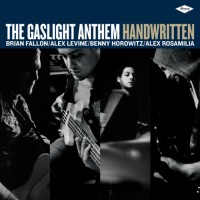
The Gaslight Anthem
Handwritten (2012)
Bryne Yancey
The tale has been told ad nauseum, with a mostly consistent narrative: A popular band rise through the independent scene with hard work and great songwriting. The major labels come calling. The band sign, giddy at the prospect of an even larger platform for their music. Fearing outright rejection (or under the influence of overbearing label suits), they write and record a "safe" major label debut, alienate their core fanbase and usually don't end up successful.
Luckily, this narrative never applied to the Gaslight Anthem, because even going back to 2007's Sink or Swim, their songs have been arena-ready. They did it right by sticking with SideOneDummy through 2010's excellent American Slang; they likely could've made the jump after Sink or Swim, but would they still be a band today if they had? Would their fanbase be as rabid as they are? Given the way majors tend to chew up bands and spit them out, it's hard to say.
Safe is generally a dirty word when it comes to a band's progression, but not in the case of TGA–crafting timelessly accessible music with roots in punk, classic rock and soul has always been their M.O. That continues on Handwritten, the band's fourth album and first for Mercury.
Handwritten is a Gaslight Anthem album through and through. The band, more so than ever before, seamlessly merge classic and contemporary influences in their songwriting, and not since 2008's fan favorite The â59 Sound has frontman Brian Fallon sounded so assured or wholly charismatic. Fallon's always been a talented vocalist, but opener "45" makes his improvements immediately apparent: His ability to belt out the words here and match the driving intensity of the band behind him is impressive. Would he have been able to keep up five years ago?
Gaslight's knack for huge choruses, one of their strongest attributes, continues on Handwritten. The title track in particular is somberly played, but the manner in which the chorus escalates without sacrificing said somberness is notable, largely thanks to the solid work of drummer Benny Horowitz.
Lead guitarist Alex Rosamilia, well known by now for his heavy hand in making Gaslight's sound unique with his talented soloing, shines on tracks like "Mulholland Drive" and "Keepsake." His playing could be referred to as calculated risk after calculated risk, but his ability to fit these solos into the band's mostly traditional framework is a testament to his skill.
But what of the band's punk influences? "Howl" is the best example of it on Handwritten, and it's perhaps the most direct song Gaslight have released since "Wooderson"–Hell, it doesn't even really have a chorus. It's also a nice bridge between the plodding, five-minute "Too Much Blood" and the bluesy, heavy "Biloxi Parish," the latter of which has been a recurring part of the band's live set for the better part of a year and is anchored by another blistering solo from Rosamilia.
"Mae" and "National Anthem" close out Handwritten on slower notes, with Fallon shining by channeling one of his idols, Bruce Springsteen: The former, with its quiet drums, melancholy guitar work and strained vocals is reminiscent of some of the Boss' best material on Born To Run, while the latter goes for something a little more Nebraska-esque with a gently strummed acoustic guitar, Fallon's echoey vocals and little else.
Brendan O'Brien, by all accounts a big name rock producer, is behind the glass for Handwritten and to his credit, he doesn't try to steer Gaslight's sound toward something it shouldn't be. Instead, the band sound like an assured group of veterans (which they aren't, really; due to their prolific nature, it's easy to forget that they've only been around since 2006) that have come into their own as musicians and songwriters, atypical timing for a major label debut. But then again, the Gaslight Anthem are an extremely special band. Their ascent, meteoric as it has been, will only continue with the release of Handwritten.